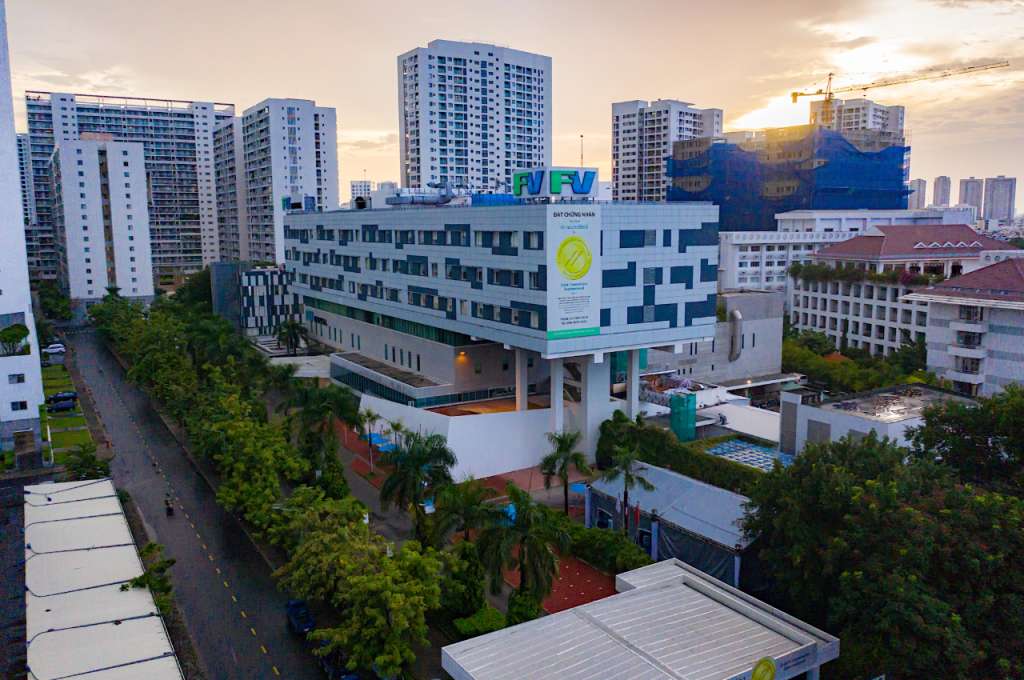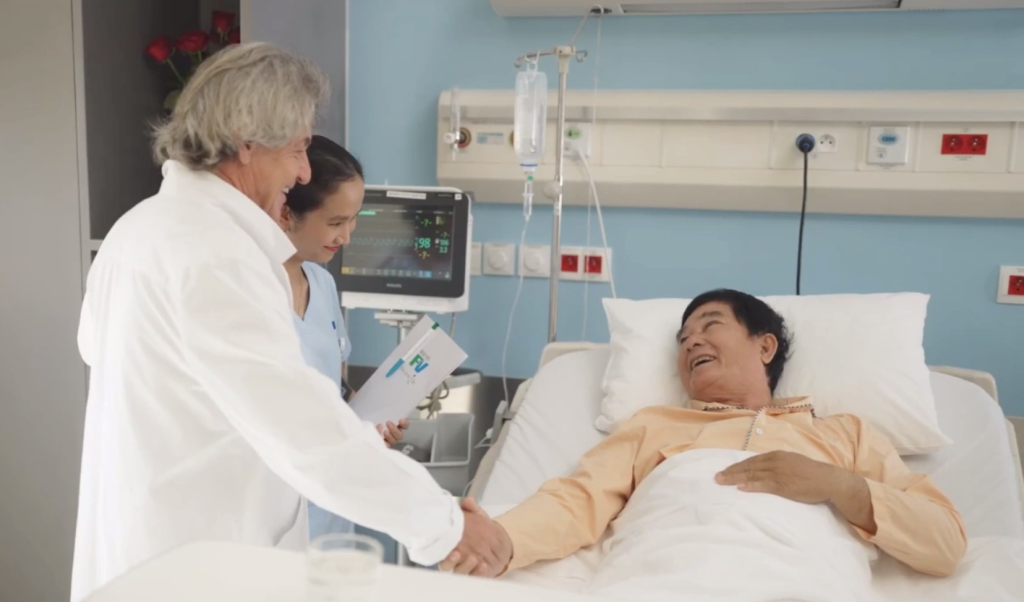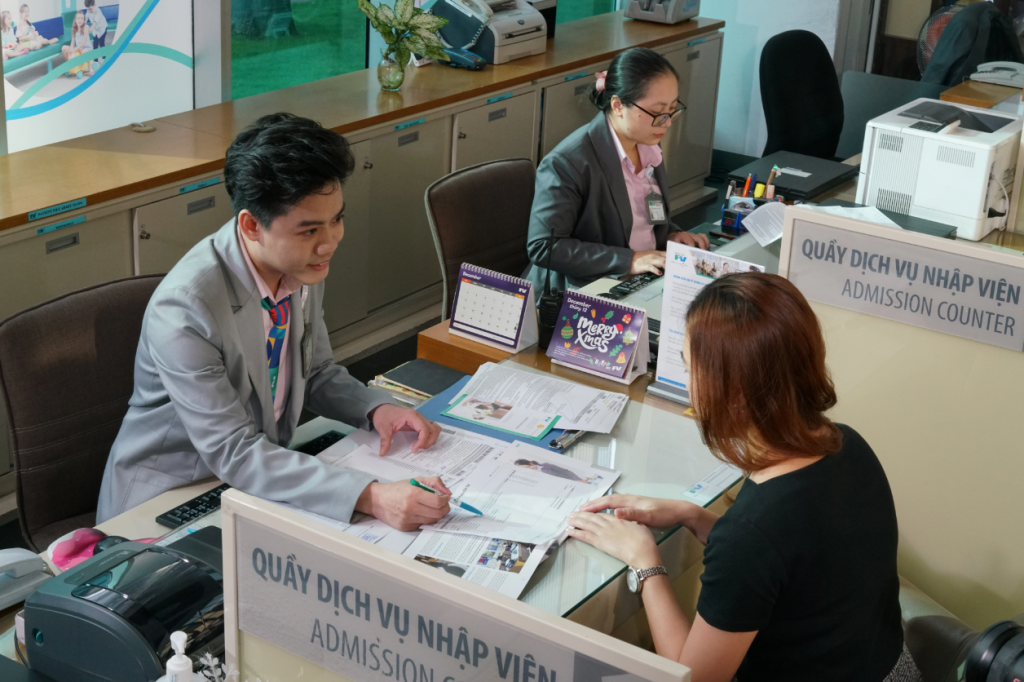As a JCI-accredited international general hospital – certified three times consecutively – FV has quietly maintained hospital fees at just 50% of those charged by international hospitals in the region for the past 21 years.
In addition, FV has introduced several policies to support patients, including subsidies of up to 20% for uninsured individuals. Looking ahead, FV will offer instalment payment options for hospital fees and expand the use of government health insurance, ensuring patients can focus on treatment without overwhelming financial worries.
In an interview with Dan Tri reporters, Dr Jean-Marcel Guillon, CEO of FV Hospital, shared the key reasons behind these impactful and practical initiatives.

As a regional-level international hospital, could you please share how FV’s pricing policy is established?
Dr Jean-Marcel Guillon: Let me take you back to FV’s beginnings 25 years ago. I visited many hospitals in Vietnam and the region, and I also hired professional market research companies to gather necessary information. One of the findings we discovered was that the pricing and cost systems in hospitals in Vietnam at that time were extremely complex. I simply asked the question: “How much is the cost for an appendectomy surgery?” but no one could provide an answer…
I also spoke with experts from several hospitals in Singapore and learned how they calculated treatment costs in packages, making all the costs transparent. I wanted to apply the same system at FV. I studied how to calculate the cost for each service unit, such as how much the cost of using an operating room for one hour would be, based on factors like building depreciation, medical staff fees, utility fees, and medical equipment depreciation. Our goal was to ensure that patients at FV would know their treatment costs in advance, with only rare exceptions for unexpected complications or risks. As a result, we developed a package pricing system for each type of service, based on the average cost of each item.
There are also treatments that are not easy to price in packages, such as inpatient medical treatment. For example, if a patient is admitted for a urinary tract infection, the doctor cannot immediately determine which type of antibiotic will be needed and how long the treatment will last. Our goal was to set prices transparently, allowing patients to know in advance the costs they would incur, while being treated in a clean, well-equipped hospital at an affordable price. That was the challenge.
So, how does FV’s pricing compare to international hospitals in the region?
Dr Jean-Marcel Guillon: We conducted a price survey at major hospitals in the region, such as Bumrungrad and Samitivej Hospitals in Thailand, Prince Court and Gleneagles in Malaysia, and Makati Medical Center and St. Luke’s Medical Center in the Philippines, and others. From this, we can confidently say that the cost at FV is only about 50% of what is charged at leading hospitals in Southeast Asia, and around 30% compared to Singapore.
We have a dedicated team that researches the pricing at hospitals across the region, carefully calculating to ensure that people in Vietnam can access high-quality healthcare services at an affordable price.
How does FV get such competitive prices?
Dr Jean-Marcel Guillon: There are two reasons. First, costs in other countries in the region are higher than in Vietnam, including expenses for medical staff and operational costs. Second, private hospitals in those countries aim for high profit margins. In contrast, FV was founded with the goal of making medical service fees affordable for Vietnamese people, while keeping profits at a reasonable level.
The management approach of hospitals may vary, but the ultimate goal is quality. We are confident that FV’s treatment quality is on par with other international hospitals in the region. So, what reason is there for Vietnamese people to seek treatment abroad?
As seen during the Covid period, many people realized that right here in Ho Chi Minh City, Vietnam, there is a hospital with international-level quality and much lower treatment costs compared to Singapore!

We are confident when we say that FV is an international general hospital: with international investment, international standards, and an international medical team. From the very beginning, FV has been committed to bringing international medical standards to Vietnam, and this commitment is the DNA of FV. This dedication has helped us achieve the international quality standard JCI certification three times in a row.
But many people in Vietnam think that FV’s price is very high. What are your thoughts on this opinion?
Dr Jean-Marcel Guillon: In a recent survey, we often heard similar comments, even from people who had never been treated at FV! However, when comparing the total costs that patient pays at other hospitals with the FV’s package pricing, the difference is often minimal.
What sets FV apart is our strict adherence to medical protocols and international healthcare standards. Some hospitals reduce costs by reusing single-use medical supplies, which violates medical guidelines, or by cutting hidden costs that compromise service quality. These practices can directly impact patient health. At FV, we would never do such things!
Furthermore, we have numerous support policies for our patients. For instance, when patients come to the Emergency Room, often at a critical juncture between life and death, our policy is to save the patient first and settle the bill later. We also have the Children of Vietnam Charitable Fund to support underprivileged children, with FV covering up to 50% of their medical costs.
Additionally, we offer subsidies up to 20% for uninsured patients. Over the past 21 years, millions of patients have benefited from these policies.

Could you elaborate on the 20% subsidy programme for patients without private health insurance?
Dr Jean-Marcel Guillon: From the very beginning, we implemented three pricing policies: First, for those with international insurance, usually expatriates living and working in Vietnam, pricing is based on the coverage outlined by international health insurance. Second, for patients with private health insurance, they benefit from package-based pricing. Third, for patient without private health insurance or with only state health insurance, this group benefits from FV’s subsidised pricing policy, which is approximately 20% lower than the second group.
Years later, private insurance began to grow, primarily through companies purchasing coverage for their employees. At this point, a “battle” emerged between FV Hospital and private insurance companies. They argued that FV charged them higher rates than uninsured patients. We had to clarify that FV’s policy is designed to support patients, not insurance companies.
Why hasn’t FV mentioned this information before?
Dr Jean-Marcel Guillon: Because we believed that supporting patients was a natural responsibility of any hospital, and did not need to mention it. However, we now realize the importance of speaking up, as many patients are unaware of these efforts. They often assume FV is too expensive and miss the opportunity to experience the high-quality healthcare services we have worked so hard to provide at the most reasonable cost. When I hear someone say that FV is expensive, I feel it’s “unfair” because, in reality, FV is not a hospital with costs beyond patients’ reach. Moreover, at FV, the value of the services patients receive matches every cost they spend.
It’s known that FV is planning to expand the scope of social health insurance coverage for its patients in the near future. Could you share more details about this?
Dr Jean-Marcel Guillon: In the past, we did not widely implement the acceptance of social health insurance because the reimbursement rates were not significant, and the number of people with such insurance was relatively small. Additionally, when applying social health insurance, the reimbursement rates and service quality are different from those provided under private insurance. For instance, some medications, medical supplies, and treatment methods under the state health insurance regulations may differ from FV’s standard protocols. However, with improvements in reimbursement rates under state health insurance, FV is now ready to implement it to offer better financial support for patients.
Specifically, FV is preparing to start accepting social health insurance for outpatient services, emergency care, and day ward beginning July 1, 2025. By January 1, 2026, FV will officially extend state health insurance coverage to include all inpatient and outpatient services.
And, FV will also be implementing an instalment payment policy for medical fees for the first time?
Dr Jean-Marcel Guillon: Yes, this is a genuine need. Many families with cancer patients requiring repeated treatments struggle to manage hospital expenses. Previously, banks in Vietnam did not support instalment payment plans for medical fees. Now, FV has partnered with VNPay to develop straightforward and transparent terms that can be applied across most banks in Vietnam. We plan to implement this policy starting January 1, 2025, to alleviate the financial burden on patients.

Of course, the instalment payment option will include a conversion fee, which will be agreed upon between the bank and the cardholder. However, FV will cover 100% of the conversion fee for patients who choose a 3-month instalment plan.
With rising prices and inflation every year; how has FV managed to keep hospital fees stable over the past 21 years while maintaining subsidy and instalment payment programmes for patients?
Dr Jean-Marcel Guillon: This is truly a challenge. In addition to the impact of inflation, hospital costs are also influenced by exchange rates, as we need to import machinery, supplies, and medicines. FV also pays salaries for foreign doctors. Since 2022, we have witnessed the continuous rise in the value of the US dollar.
The last time FV adjusted its fees was in November 2022, when the Vietnamese dong depreciated by nearly 10% against the US dollar. Since then, the US dollar has continued to rise, and inflation has persisted. However, we chose to absorb these additional costs for our patients. Our strategy has been to reduce the profit margin to keep hospital fees affordable and support patients during the current challenging economic situation.
Thank you for taking the time to join this interview!

 Vi
Vi 












